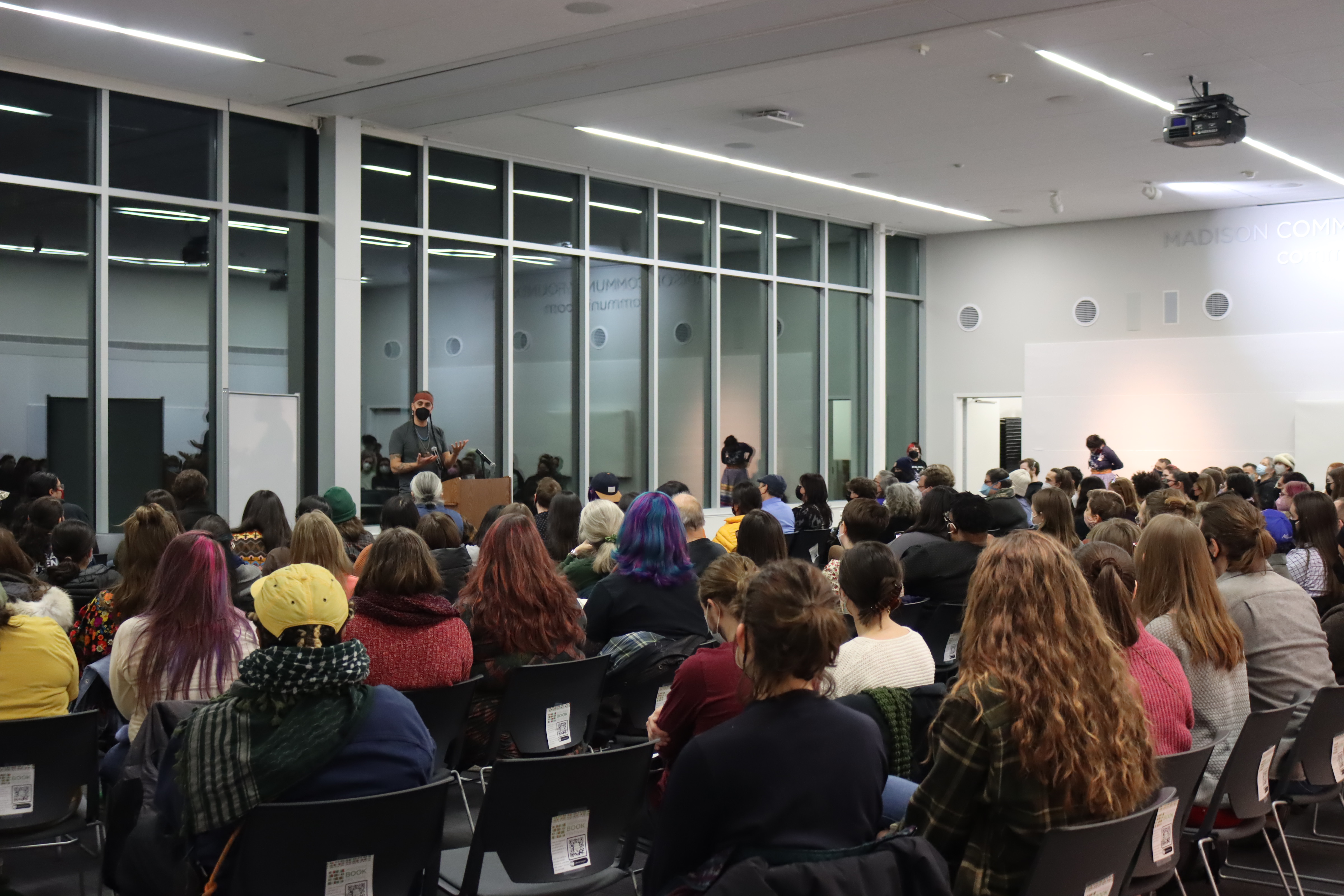
- Details
- By Darren Thompson
MADISON, Wisc. — On Saturday, February 26, the Madison Public Library hosted Thrival Tools: Indigenous Winter Survival and Brilliance, a storytellers celebration that opened the organization’s live public programming for the year.
The two and a half hour, over-capacity event featured Ho-Chunk speaker Jon-Jon Greendeer, Lac du Flambeau Ojibwe speaker Greg “Biskakone” Johnson, Yup’ik educator and performer Anastasia Adams, and local Chicana community organizer and activist Shadayra Kilfoy-Flores.
“When Europeans came here, they didn’t realize there were so many chapters that existed before our co-existence,” said Ho-Chunk storyteller Jon-Jon Greendeer during the presentation. “Indigenous people, even beyond Turtle Island, have our own way of life.”
Want more Native News? Get the free daily newsletter today.
“When talking about thriving in winter, the skills, wisdom, and knowledge that our people once shared with one another were lost in boarding schools,” said Greendeer. “Many of us cannot go to our oldest relatives and ask them how things used to be, because a stoppage in knowledge and our generation has to make the quantum leap to learn about our way of life.”
Speakers also shared stories of how their elders provided for their families in the winter using commodities. In early reservation days, many families lived off commodities, the government-rationed foods that included flour, lard, sugar, and powdered-milk. Grape juice concentrate and sugar was made into jam, while flour, lard, sugar, and powdered milk were made into fry bread. These new foods contributed to obesity, diabetes, heart disease and more in many Native communities.
“We’ve had an amazing turnout and I’ve learned something from every presenter,” said Madison Library Community Engagement Library Kristina Gomez to Native News Online. “This was really well received by the audience.”
The event featured an opening and closing by the MadTown Singers, a local drum group. The program was created and planned by a group of Indigenous women that live in the area who applied to be part of the Library Takeover program, said Gomez.
Additional resources including an Indigenous-focused book display, reading lists, online resources, recipes, and more were organized for participants to internalize the learning and experience.
More Stories Like This
Native News Weekly (August 25, 2024): D.C. BriefsUS Presidents in Their Own Words Concerning American Indians
Merry Christmas 2025
Navajo Man Faces Vehicular Homicide Charge After Child Killed at Navajo Nation Christmas Parade
Next on Native Bidaské: Lumbee Tribal Chairman John Lowery
Help us defend tribal sovereignty.
At Native News Online, our mission is rooted in telling the stories that strengthen sovereignty and uplift Indigenous voices — not just at year’s end, but every single day.
Because of your generosity last year, we were able to keep our reporters on the ground in tribal communities, at national gatherings and in the halls of Congress — covering the issues that matter most to Indian Country: sovereignty, culture, education, health and economic opportunity.
That support sustained us through a tough year in 2025. Now, as we look to the year ahead, we need your help right now to ensure warrior journalism remains strong — reporting that defends tribal sovereignty, amplifies Native truth, and holds power accountable.
 The stakes couldn't be higher. Your support keeps Native voices heard, Native stories told and Native sovereignty defended.
The stakes couldn't be higher. Your support keeps Native voices heard, Native stories told and Native sovereignty defended.
Stand with Warrior Journalism today.
Levi Rickert (Potawatomi), Editor & Publisher
